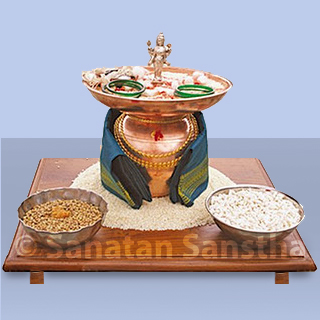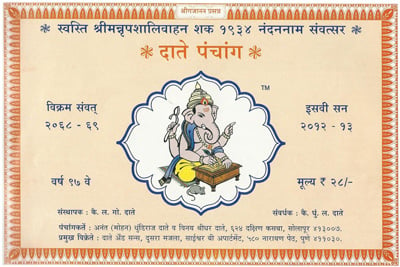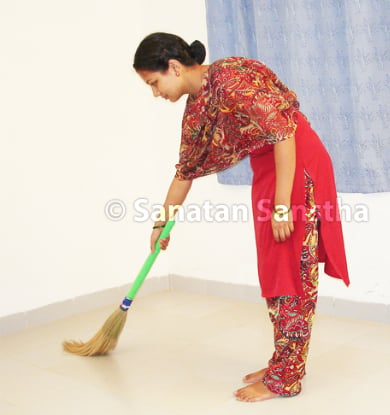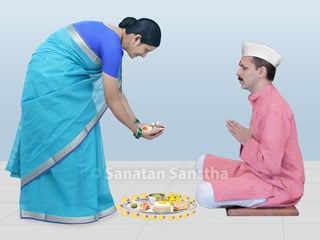Contents [hide]
- History
- Shri Lakshmi Kuber puja ritual
- Achaman
- Saying of the Desh-kala (Place and the time)
- Resolve
- Ritualistic worship of Shri Ganapati
- Shrivishnusmaran
- Worship of Kalash (Pot)
- Worship of the bell
- Worship of the lamp
- Worship and meditate on Shri Lakshmi kuber
- Invocation
- The seat
- The feet
- Offering water
- Achaman
- The bath
- Panchamrut
- Bath with sandalwood paste
- Mahabhishek
- Vastra (Clothes)
- Blouse
- Sandalwood paste
- Turmeric powder-Kumkum
- Ornaments
- Flowers
- Frankincense
- Lamp
- Naivedya
- Fruits
- Betel leaf
- Arati
- Paying obeisance
- Circumambulation
- Mantrapushpanjali
- Prayer to Lakshmi and Kuber
- Prayer you can offer to Shri Lakshmi and Devi Saraswati
- Importance of staying awake on this night
- Alakshmi nissaran (Removal of poverty)
- Video : Ritualistic worship of Shri lakshmi
Shri Lakshmi Kuber Puja (Lakshmi Puja) is performed in all temples, shops and homes on the auspicious day of Ashwin Amavasya during Diwali. Normally the new moon day is considered inauspicious; however, this particular new moon day is an exception. This is the day when we perform ritualistic worship of Shri Lakshmi and Kuber.
Devi Lakshmi is the Deity of wealth, whereas Deity Kuber is the treasurer. Several people possess the art of earning money; but since they do not know how to save it, they incur unnecessary expenses and have no savings. In fact, far more important than earning money is saving it, guarding it and spending it at the right place. Deity Kuber is the Deity who teaches the art of saving money, as He Himself is the treasurer. Therefore, in this ritual the worship of Devi Lakshmi and Deity Kuber has been recommended. All people, especially the business community celebrate this festival with great enthusiasm and splendour.
History
A legend has it that on this day Shri Vishnu along with Devi Lakshmi liberated all Deities from Bali’s captivity.
Shri Lakshmi Kuber puja ritual
After a mangalsnan at the break of dawn, we should worship the Deities. In the afternoon parvanshraddh (rite for the departed ancestors) is performed, Brahmans are offered meals; in the evening in a pandal decorated with creepers and leaves Devi Lakshmi, Shri Vishnu, Deity Kuber and other Deities are worshipped. When performing Devi Lakshmi-puja an idol of Devi Lakshmi should be installed on a seat, on which either an eight-petalled lotus or a swastik (symbol representing the Principle of Divine Energy) is drawn with akshata. At some places a tamhan (shelving dish) is placed on a kalash and the idol of Devi Lakshmi is installed on it. Next to Her, an Idol of Deity Kuber is placed. Then all these Deities, including Devi Lakshmi, are offered naivedya prepared from cow’s milk with sugar, cardamom and cloves added to it. Items like coriander, jaggery, popped rice, sugar candies etc. are offered to Devi Lakshmi and then distributed to well-wishers and friends.
The scriptural information of Shri Lakshmi Kuber puja is given here in simple language along with mantras and their meanings in English.

Achaman
Achaman (Sipping water from the cupped palm thrice while uttering the three Names of Shrivishnu and releasing the water into the plate from the palm while uttering the fourth Name.)
While uttering the three Names, drink the water from the right hand which is taken by the spoon with the left hand.-
श्री केशवाय नमः । श्री नारायणाय नमः । श्री माधवाय नमः । (śrī keśavāya namaḥ । śrī nārāyaṇāya namaḥ । śrī mādhavāya namaḥ ।)
‘श्री गोविन्दाय नमः ।’ (śrī govindāya namaḥ ।)
Then say ‘Shri Govindaya namaha |’ and release the water from the hand into the plate.
Thereafter, utter the names given ahead –
श्री विष्णवे नमः । श्री मधुसूदनाय नमः । श्री त्रिविक्रमाय नमः । श्री वामनाय नमः । श्री श्रीधराय नमः । श्री हृषीकेशाय नमः । श्री पद्मनाभाय नमः । श्री दामोदराय नमः । श्री संकर्षणाय नमः । श्री वासुदेवाय नमः । श्री प्रद्युम्नाय नमः । श्री अनिरुद्धाय नमः । श्री पुरुषोत्तमाय नमः । श्री अधोक्षजाय नमः । श्री नारसिंहाय नमः । श्री अच्युताय नमः । श्री जनार्दनाय नमः । श्री उपेन्द्राय नमः । श्री हरये नमः । श्री श्रीकृष्णाय नमः ।
(śrī viṣṇave namaḥ । śrī madhusūdanāya namaḥ । śrī trivikramāya namaḥ । śrī vāmanāya namaḥ । śrī śrīdharāya namaḥ । śrī hṛṣīkeśāya namaḥ । śrī padmanābhāya namaḥ । śrī dāmodarāya namaḥ । śrī saṃkarṣaṇāya namaḥ । śrī vāsudevāya namaḥ । śrī pradyumnāya namaḥ । śrī aniruddhāya namaḥ । śrī puruṣottamāya namaḥ । śrī adhokṣajāya namaḥ । śrī nārasiṃhāya namaḥ । śrī acyutāya namaḥ । śrī janārdanāya namaḥ । śrī upendrāya namaḥ । śrī haraye namaḥ । śrī śrīkṛṣṇāya namaḥ ।)
Achman may be done the same way again. This has to be done twice before and after the ritualistic worship.
(Fold your hands)
Prayer –
श्रीमन्महागणाधिपतये नमः । इष्टदेवताभ्यो नमः । कुलदेवताभ्यो नमः । ग्रामदेवताभ्यो नमः । स्थानदेवताभ्यो नमः । वास्तुदेवताभ्यो नमः । आदित्यादिनवग्रहदेवताभ्यो नमः । सर्वेभ्यो देवेभ्यो नमः । सर्वेभ्यो ब्राह्मणेभ्यो नमो नमः । अविघ्नमस्तु ।
śrīmanmahāgaṇādhipataye namaḥ । iṣṭadevatābhyo namaḥ । kuladevatābhyo namaḥ । grāmadevatābhyo namaḥ । sthānadevatābhyo namaḥ । vāstudevatābhyo namaḥ । ādityādinavagrahadevatābhyo namaḥ । sarvebhyo devebhyo namaḥ । sarvebhyo brāhmaṇebhyo namo namaḥ । avighnamastu ।
Saying of the Desh-kala (Place and the time)

The worshipper should apply some water to both the eyes and say the Deshkal as given ahead.
(31.10.2024)
श्रीमद्भगवतो महापुरुषस्य विष्णोराज्ञया प्रवर्तमानस्य अद्य ब्रह्मणो द्वितीये परार्धे विष्णुपदे श्रीश्वेत-वाराहकल्पे वैवस्वत मन्वंतरे अष्टाविंशतितमे युगे युगचतुष्के कलियुगे कलि प्रथम चरणे जंबुद्वीपे भरतवर्षे भरतखंडे दक्षिणापथे रामक्षेत्रे बौद्धावतारे दंडकारण्ये देशे गोदावर्याः दक्षिणतीरे शालिवाहन शके अस्मिन्वर्तमाने व्यावहारिके क्रोधी नाम संवत्सरे, दक्षिणायने, शरदऋतौ, आश्विन मासे, कृष्ण पक्षे, अमायांतिथौ, बृहस्पती वासरे, चित्रा दिवस नक्षत्रे, प्रीति योगे, चतुष्पाद करणे, तुला स्थिते वर्तमाने श्रीचंद्रे, तुला स्थिते वर्तमाने श्रीसूर्ये, वृषभ स्थिते वर्तमाने श्रीदेवगुरौ, कुंभ स्थिते वर्तमाने श्रीशनैश्चरे, शेषेषु सर्वग्रहेषु यथायथं राशिस्थानानि स्थितेषु एवं ग्रहगुणविशेषण विशिष्टायां शुभपुण्यतिथौ…..l
śrīmadbhagavato mahāpuruṣasya viṣṇorājñayā pravartamānasya adya brahmaṇo dvitīye parārdhe viṣṇupade śrīśveta-vārāhakalpe vaivasvata manvaṃtare aṣṭāviṃśatitame yuge yugacatuṣke kaliyuge kali prathama caraṇe jaṃbudvīpe bharatavarṣe bharatakhaṃḍe dakṣiṇāpathe rāmakṣetre bauddhāvatāre daṃḍakāraṇye deśe godāvaryāḥ dakṣiṇatīre śālivāhana śake asminvartamāne vyāvahārike krodhī nāma saṃvatsare, dakṣiṇāyane, śaradaṛtau, āśvina māse, kṛṣṇa pakṣe, amāyāṃtithau, brhaspati vāsare, chitrā divasa nakṣatre, prīti yoge, chatushpad karaṇe, tulā sthite vartamāne śrīcaṃdre, tulā sthite vartamāne śrīsūrye, vṛṣabha sthite vartamāne śrīdevagurau, kuṃbha sthite vartamāne śrīśanaiścare, śeṣeṣu sarvagraheṣu yathāyathaṃ rāśisthānāni sthiteṣu evaṃ grahaguṇaviśeṣaṇa viśiṣṭāyāṃ śubhapuṇyatithau…..
(1.11.2024)
श्रीमद्भगवतो महापुरुषस्य विष्णोराज्ञया प्रवर्तमानस्य अद्य ब्रह्मणो द्वितीये परार्धे विष्णुपदे श्रीश्वेत-वाराहकल्पे वैवस्वत मन्वंतरे अष्टाविंशतितमे युगे युगचतुष्के कलियुगे कलि प्रथम चरणे जंबुद्वीपे भरतवर्षे भरतखंडे दक्षिणापथे रामक्षेत्रे बौद्धावतारे दंडकारण्ये देशे गोदावर्याः दक्षिणतीरे शालिवाहन शके अस्मिन्वर्तमाने व्यावहारिके क्रोधी नाम संवत्सरे, दक्षिणायने, शरदऋतौ, आश्विन मासे, कृष्ण पक्षे, अमायांतिथौ (१८.१७ पर्यंत), शुक्र वासरे, स्वाती दिवस नक्षत्रे, प्रीति (१०.४१ नंतर आयुष्मान) योगे, नाग करणे, तुला स्थिते वर्तमाने श्रीचंद्रे, तुला स्थिते वर्तमाने श्रीसूर्ये, वृषभ स्थिते वर्तमाने श्रीदेवगुरौ, कुंभ स्थिते वर्तमाने श्रीशनैश्चरे, शेषेषु सर्वग्रहेषु यथायथं राशिस्थानानि स्थितेषु एवं ग्रहगुणविशेषण विशिष्टायां शुभपुण्यतिथौ…..l
śrīmadbhagavato mahāpuruṣasya viṣṇorājñayā pravartamānasya adya brahmaṇo dvitīye parārdhe viṣṇupade śrīśveta-vārāhakalpe vaivasvata manvaṃtare aṣṭāviṃśatitame yuge yugacatuṣke kaliyuge kali prathama caraṇe jaṃbudvīpe bharatavarṣe bharatakhaṃḍe dakṣiṇāpathe rāmakṣetre bauddhāvatāre daṃḍakāraṇye deśe godāvaryāḥ dakṣiṇatīre śālivāhana śake asminvartamāne vyāvahārike krodhī nāma saṃvatsare, dakṣiṇāyane, śaradaṛtau, āśvina māse, kṛṣṇa pakṣe, amāyāṃtithau (till 18.17), śukra vāsare, svātī divasa nakṣatre, prīti (after 10.41 āyuṣmāna) yoge, nāga karaṇe, tulā sthite vartamāne śrīcaṃdre, tulā sthite vartamāne śrīsūrye, vṛṣabha sthite vartamāne śrīdevagurau, kuṃbha sthite vartamāne śrīśanaiścare, śeṣeṣu sarvagraheṣu yathāyathaṃ rāśisthānāni sthiteṣu evaṃ grahaguṇaviśeṣaṇa viśiṣṭāyāṃ śubhapuṇyatithau…..
(On the auspicious tithi of Amavasya (Note) in the month of Ashwin in Sharad season in Dakshinayan in the year called Krodhi in the present Shalivahan era in the country called Aryavarta (Note 1) (In the Ramkshetra in Bouddha Incarnation on the southern bank of River Godavari in Dandakaranya country in Bharat continent of Bharatvarsha in Jambudweep) in the first phase of Kaliyug of the four yugas from the twenty-eithth yuga in the Vaivaswat Manwantar in Shrishwet-Varaha Kalpa in Vishnupada of Brahmadeva’s second Parardha which is inspired by the Supreme God Bhagawan Shrivishnu)
Note 1 – Here Deshkal is in reference to the whole of Bharat and so it is mentioned as ‘Aryavartdesh’ In this manner, the name of the country is to be mentioned and the deshkal be mentioned accordingly
Those who find the above Deshkal difficult can say the Shloka given ahead and say they make a sankalp (Resolve).
तिथिर्विष्णुस्तथा वारं नक्षत्रं विष्णुरेव च ।
योगश्च करणं चैव सर्वं विष्णुमयं जगत् ।।
(tithirviṣṇustathā vāraṃ nakṣatraṃ viṣṇureva ca ।
yogaśca karaṇaṃ caiva sarvaṃ viṣṇumayaṃ jagat ।।)
Resolve
Take some Akshata (Unbroken rice grains) in your right hand and make the resolve.
मम आत्मनः परमेश्वर-आज्ञारूप-सकलशास्त्र-श्रुतिस्मृतिपुराणोक्त-फलप्राप्तिद्वारा श्रीपरमेश्वरप्रीत्यर्थं श्रीमहालक्ष्मीप्रीतिद्वारा अलक्ष्मीपरिहारपूर्वकं विपुलश्रीप्राप्ति-सन्मंगल-महैश्वर्य-कुलाभ्युदय-सुखसमृद्ध्यादि-कल्पोक्त-फलसिद्ध्यर्थं लक्ष्मीपूजनं कुबेरपूजनं च करिष्ये । तत्रादौ निर्विघ्नतासिद्ध्यर्थं महागणपतिपूजनं करिष्ये । शरीरशुद्ध्यर्थं विष्णुस्मरणं करिष्ये । कलशशंखघंटादीपपूजनं करिष्ये ।
(mama ātmanaḥ parameśvara-ājñārūpa-sakalaśāstra-śrutismṛtipurāṇokta-phalaprāptidvārā śrīparameśvaraprītyarthaṃ śrīmahālakṣmīprītidvārā alakṣmīparihārapūrvakaṃ vipulaśrīprāpti-sanmaṃgala-mahaiśvarya-kulābhyudaya-sukhasamṛddhyādi-kalpokta-phalasiddhyarthaṃ lakṣmīpūjanaṃ kuberapūjanaṃ ca kariṣye । tatrādau nirvighnatāsiddhyarthaṃ mahāgaṇapatipūjanaṃ kariṣye । śarīraśuddhyarthaṃ viṣṇusmaraṇaṃ kariṣye । kalaśaśaṃkhaghaṃṭādīpapūjanaṃ kariṣye ।)
Meaning : I am performing this ritualistic worship of Lakshmi and Deity Kuber for various benefits like removal of my/our poverty and acquisition of more wealth, auspicious opulence, growth of dynasty, pleasure and prosperity by the love of Shri Mahalakshmi.
Ritualistic worship of Shri Ganapati
Take some rice grains in a plate or a wooden board. Keep betel leaf and coconut on it.The tuft of the coconut must face the worshipper. Keep the stem of the leaf towards the Deity and the other end towards the worshipper. Say the mantra given ahead and perform worship.
वक्रतुण्ड महाकाय कोटिसूर्यसमप्रभ ।
निर्विघ्नं कुरु मे देव सर्वकार्येषु सर्वदा ।।
(vakratuṇḍa mahākāya koṭisūryasamaprabha ।
nirvighnaṃ kuru me deva sarvakāryeṣu sarvadā ।।)
Meaning : Oh Ganesh, you are the one with the curved trunk, huge body, a Deity who has the light equal to that of crores of suns, help me do all my jobs always without any obstacles.
ऋद्धिबुद्धिशक्तिसहितमहागणपतये नमो नमः । (ṛddhibuddhiśaktisahita mahāgaṇapataye namo namaḥ ।)
Meaning : With Rrdhi, intellect and Shakti I pay obeisnce to Mahaganapati.
महागणपतिं साङ्गं सपरिवारं सायुधं सशक्तिकम् आवाहयामि । (mahāgaṇapatiṃ sāṅgaṃ saparivāraṃ sāyudhaṃ saśaktikam āvāhayāmi ।)
Meaning : I invoke Mahaganapati to come with all His family members and with His weapons and powers.
महागणपतये नमः । ध्यायामि । (mahāgaṇapataye namaḥ । dhyāyāmi ।)
(I meditate on Mahaganapati.)
महागणपतये नमः । आवाहयामि । (mahāgaṇapataye namaḥ । āvāhayāmi ।)
(Pay obeisance to Mahaganapati and invoke Him.)
(Offer some Akshata.)
महागणपतयेनमः । आसनार्थे अक्षतान् समर्पयामि । (mahāgaṇapatayenamaḥ । āsanārthe akṣatān samarpayāmi ।)
(I pay obeisance to Mahaganapati and offer Akshata to the seat.)
(Offer Akshata.)
महागणपतये नमः । चन्दनं समर्पयामि । (mahāgaṇapataye namaḥ । candanaṃ samarpayāmi ।)
(I pay obeisance to Mahaganapti and offer sandalwood paste.) (Apply sandalwood paste to the coconut.)
ऋद्धिसिद्धिभ्यां नमः । हरिद्राकुङ्कुमं समर्पयामि । (ṛddhisiddhibhyāṃ namaḥ । haridrākuṅkumaṃ samarpayāmi ।)
(I pay obeisance to Ridhi Sidhi and offer turmeric powder and vermilion)
(Offer turmeric powder and vermilion)
महागणपतये नमः । पूजार्थे कालोद्भवपुष्पाणि समर्पयामि । (mahāgaṇapataye namaḥ । pūjārthe kālodbhavapuṣpāṇi samarpayāmi ।)
(I pay obeisance to Mahaganapati and offer fresh flowers for the worship.)
(Offer the flowers.)
महागणपतये नमः । दूर्वाङ्कुरान् समर्पयामि । (mahāgaṇapataye namaḥ । dūrvāṅkurān samarpayāmi ।)
(I pay obeisance to Mahaganapati and offer durva [A fragrant grass]).
(Offer durva.)
महागणपतये नमः । धूपम् समर्पयामि । (mahāgaṇapataye namaḥ । dhūpam samarpayāmi ।)
(I pay obeisance to Mahaganapati and offer frankincense.)
(Move the incense stick in circular manner.)
महागणपतये नमः । दीपं समर्पयामि । (mahāgaṇapataye namaḥ । dīpaṃ samarpayāmi ।)
(I pay obeisance to Mahaganapati and offer offer a lamp.)
(Move the lamp in a circular manner.)
महागणपतये नमः । नैवेद्यार्थे पुरतस्थापित-मधुरनैवेद्यं निवेदयामि । (mahāgaṇapataye namaḥ । naivedyārthe puratasthāpita-madhuranaivedyaṃ nivedayāmi ।)
(I pay obeisance to Mahaganapati and offer sweet Prasad [Holy sacrament]) .
(Hold durvas in the right hand or a flower with water on it, sprinkle it on the Prasad, close both the eyes with the left hand and recite the mantra given ahead.)
प्राणाय नमः । (prāṇāya namaḥ ।)
(I offer this for the pran.)
अपानाय नमः । (apānāya namaḥ ।)
(I offer this for the apan.)
व्यानाय नमः । (vyānāya namaḥ ।)
(I offer this for the vyana.)
उदानाय नमः । (udānāya namaḥ ।)
(I offer this for the udan.)
समानाय नमः । (samānāya namaḥ ।0
(I offer this for the samana.)
ब्रह्मणे नमः । (brahmaṇe namaḥ ।)
(I offer this for Brahma.)
(The flower of the durva may be offered to the coconut.)
Note : We can also say swaha instead of Namaha.
महागणपतये नमः । नैवेद्यं समर्पयामि । (mahāgaṇapataye namaḥ । naivedyaṃ samarpayāmi ।)
(I pay obeisance to Mahaganapati and offer this Prasad.)
मध्ये पानीयं समर्पयामि । (madhye pānīyaṃ samarpayāmi ।)
(I offer water for drinking purpose intermittently.)
उत्तरापोशनं समर्पयामि । (uttarāpośanaṃ samarpayāmi ।)
(I offer this water to sip before and after the meals.)
हस्तप्रक्षालनं समर्पयामि । (hastaprakṣālanaṃ samarpayāmi ।)
(I offer this water to wash hands.)
मुखप्रक्षालनं समर्पयामि । (mukhaprakṣālanaṃ samarpayāmi ।)
(I offer this water to rinse the mouth.)
करोद्वर्तनार्थे चन्दनं समर्पयामि । (karodvartanārthe candanaṃ samarpayāmi ।)
(I offer the sandal for applying to the hand.)
मुखवासार्थे पूगीफलताम्बूलं समर्पयामि । (mukhavāsārthe pūgīphalatāmbūlaṃ samarpayāmi ।)
(I offer the betel leaf and nut as mouth freshners.)
दक्षिणां समर्पयामि । (dakṣiṇāṃ samarpayāmi ।)
(I offer the monetary gift.)
(Say ‘samarpayami’, and release the water in the plate through the palm )
अचिन्त्याव्यक्तरूपाय निर्गुणाय गुणात्मने ।
समस्तजगदाधारमूर्तये ब्रह्मणे नमः ।।
(acintyāvyaktarūpāya nirguṇāya guṇātmane ।
samastajagadādhāramūrtaye brahmaṇe namaḥ ।।)
(I pay obeisance to Brahma, who is unthinkable, formless, nirgun, in the form of a soul who is a support to the whole world.)
कार्यं मे सिद्धिमायातु प्रसन्ने त्वयि धातरि ।
विघ्नानि नाशमायान्तु सर्वाणि गणनायक ।।
(kāryaṃ me siddhimāyātu prasanne tvayi dhātari ।
vighnāni nāśamāyāntu sarvāṇi gaṇanāyaka ।।)
(O Ganapati ! When you are present and pleased, let the work that I undertake be completed and if any obstacles arise, let them be destroyed.)
अनया पूजया सकलविघ्नेश्वरविघ्नहर्तामहागणपतिः प्रीयताम् ।
(anayā pūjayā sakalavighneśvaravighnahartāmahāgaṇapatiḥ prīyatām ।)
(With this Puja, let all the obstacles be destroyed and let Mahaganapati be pleased.)
(Take some water on the right hand palm and release it in the plate.)
Shrivishnusmaran
Fold hands and say ‘Vishnave namo’ 9 times and in the end, say ‘Vishnave namaha |’
Worship of Kalash (Pot)
कलशदेवताभ्यो नमः सर्वोपचारार्थे गंधाक्षतपुष्पं समर्पयामि ।
(kalaśadevatābhyo namaḥ sarvopacārārthe gaṃdhākṣatapuṣpaṃ samarpayāmi ।)
(Offer sandalwood paste, Akshata and flower together in the Kalash.)
Worship of the bell
घंटायै नमः सर्वोपचारार्थे गंधाक्षतपुष्पं समर्पयामि ।
(ghaṃṭāyai namaḥ sarvopacārārthe gaṃdhākṣatapuṣpaṃ samarpayāmi ।)
(Offer sandalwood paste, Akshata and a flower to the bell.)
Worship of the lamp
दीपदेवताभ्यो नमः सर्वोपचारार्थे गंधाक्षतपुष्पं समर्पयामि ।
(dīpadevatābhyo namaḥ sarvopacārārthe gaṃdhākṣatapuṣpaṃ samarpayāmi ।)
(Offer sandalwood paste, Akshata and a flower to the lamp.)
अपवित्रः पवित्रो वा सर्वावस्थाङ्गतोऽपि वा ।
यः स्मरेत्पुण्डरीकाक्षं स बाह्याभ्यन्तरः शुचिः ।।
(apavitraḥ pavitro vā sarvāvasthāṅgato’pi vā ।
yaḥ smaretpuṇḍarīkākṣaṃ sa bāhyābhyantaraḥ śuciḥ ।।)
(Whether the gross body is clean or not, whatever be the state, the man who remembers Kamalnayan (Shrivishnu) is clean inside–out.)
With this mantra, dip the Tulsi [Basil] leaf in water and sprinkle water on the instrument rquired for worship and on self.
Worship and meditate on Shri Lakshmi kuber
ध्यायामि तां महालक्ष्मीं कर्पूरक्षोदपाण्डुराम् । शुभ्रवस्त्रपरीधानां मुक्ताभरणभूषिताम् ।।
पङ्कजासनसंस्थानां स्मेराननसरोरुहाम् । शारदेन्दुकलाकान्तिं स्निग्धनेत्रां चतुर्भुजाम् ।।
पद्मयुग्माभयवरव्यग्रचारुकराम्बुजाम् । अभितो गजयुग्मेन सिच्यमानां कराम्बुना ।।
(dhyāyāmi tāṃ mahālakṣmīṃ karpūrakṣodapāṇḍurām । śubhravastraparīdhānāṃ muktābharaṇabhūṣitām ।।
paṅkajāsanasaṃsthānāṃ smerānanasaroruhām । śāradendukalākāntiṃ snigdhanetrāṃ caturbhujām ।।
padmayugmābhayavaravyagracārukarāmbujām । abhito gajayugmena sicyamānāṃ karāmbunā ।।)
Meaning : I meditate and see the form of Shri Mahalakshmi, who is wearing a saree which is white like the powdered camphor, with ornaments, standing on a lotus, with a smile on her face, with a beautiful face like the full moon, with beautiful eyes and four hands. Two hands are holding the lotus and the other two hands in a posture of blessing. Two elephants with their trunks are showering water from all sides.
Note :
1.Reciting the mantras with proper pronunciation is not always possible. So we are giving a simple worship which is with the chant and mantra. The worshipper should note that the actual mantra is not given but the meaning is given. This will make the worship with bhav as the individual will understand the meaning.
2. While saying ’Avahyami’ ( ‘आवाहयामि’) and ‘Samarpayami’ (‘समर्पयामि’), the worshipper should have the bhav of offering with devotion.
Invocation
महालक्ष्मि समागच्छ पद्मनाभपदादिह ।
पूजामिमां गृहाण त्वं त्वदर्थं देवि संभृताम् ।।
(mahālakṣmi samāgaccha padmanābhapadādiha ।
pūjāmimāṃ gṛhāṇa tvaṃ tvadarthaṃ devi saṃbhṛtām ।।)
(O Mahalakshmi ! Come here from the lotus feet of Shrivishnu and accept my worship.)
Take Akshata in the right hand.
(Every time when Akshata are offered, do it by bringing the middle finger, ring finger and the thumb together.)
श्री लक्ष्मीकुबेराभ्यां नमः । आवाहयामि ।। (śrī lakṣmīkuberābhyāṃ namaḥ । āvāhayāmi ।।)
(Fold hands.)
The seat
श्री लक्ष्मीकुबेराभ्यां नमः आसनार्थे अक्षतान् समर्पयामि ।।
(śrī lakṣmīkuberābhyāṃ namaḥ āsanārthe akṣatān samarpayāmi ।।)
(Offer Akshata at the feet of Shri Lakshmikuber.)
(O Lakshmi ! You live in the Lotus. Come in this Lotus to bless me.)
(If there is a photograph, sprinkle water with a flower or a tulsi (basal ) leaf. If it is an idol or a statue keep it in front of you in the plate and do the following ritual. )
The feet
श्री लक्ष्मीकुबेराभ्यां नमः । पाद्यं समर्पयामि ।। (śrī lakṣmīkuberābhyāṃ namaḥ । pādyaṃ samarpayāmi ।।)
(Release some water with the right hand by a ladle on the feet of Shri Lakshmi.)
(I am using the water from the Holy Ganga which is full of various mantras for washing the feet as this will remove the fatigue of the journey.)
Offering water
श्री लक्ष्मीकुबेराभ्यां नमः । अर्घ्यं समर्पयामि ।। (śrī lakṣmīkuberābhyāṃ namaḥ । arghyaṃ samarpayāmi ।।)
(Take water in the ladle and hold it in the left hand. Put Akshata, sandalwood paste and a flower in it.Then with the right hand offer it at the feet of Shri Lakshmi.)
Meaning : O Mahalakshmi ! Your grace is on the devotee; so accept this water which destroys the sin and creates merits.
Achaman
श्री लक्ष्मीकुबेराभ्यां नमः । आचमनीयं समर्पयामि ।। (śrī lakṣmīkuberābhyāṃ namaḥ । ācamanīyaṃ samarpayāmi ।।)
(Release some water with the right hand by a ladle at the feet of Shri Lakshmi.)
Meaning : O Jagdambike ! Drink this pure and cool water, which is mixed with camphor and aloe for the Achaman.
The bath
श्री लक्ष्मीकुबेराभ्यां नमः । स्नानं समर्पयामि ।। (śrī lakṣmīkuberābhyāṃ namaḥ । snānaṃ samarpayāmi ।।)
(Release some water with the right hand by a ladle at the feet of Shri Lakshmi.)
Meaning : O Mahalakshmi ! Accept this water mixed with camphor and aloe, which is brought from the Holy river, for the bath.)
Panchamrut
(A mixture of milk, curd, honey, sugar and pure ghee)
श्री लक्ष्मीकुबेराभ्यां नमः । पंचामृतस्नानं समर्पयामि। तदन्ते शुद्धोदकस्नानं समर्पयामि ।।
(śrī lakṣmīkuberābhyāṃ namaḥ । paṃcāmṛtasnānaṃ samarpayāmi। tadante śuddhodakasnānaṃ samarpayāmi ।।)
(Milk, curds, ghee, honey and sugar is mixed and offered at the Holy feet of the Deity. This is followed by pouring a ladle of pure water.)
Meaning : O Shri Mahalakshmi, accept the Panchamrut made from milk, curds, ghee, honey and sugar for the bath.
Bath with sandalwood paste
श्री लक्ष्मीकुबेराभ्यां नमः । गंधोदकस्नानं समर्पयामि ।।
(śrī lakṣmīkuberābhyāṃ namaḥ । gaṃdhodakasnānaṃ samarpayāmi ।।)
(Take a ladle full of water and add sandalwood paste to it and offer it at the Holy feet of the Devi.)
Meaning : Accept this scented water with sandalwood paste, camphor, and cardamom for bath.
Mahabhishek
(Do Abhishek [Consecration with water] as per the authority given by Shrisukt/ Puranokta or Devisukta.)
Thereafter the idol or the photo should be washed, wiped and put in the original place. The worship can be performed as shared below.
Vastra (Clothes)
श्री लक्ष्मीकुबेराभ्यां नमः । वस्त्रोपवस्त्रार्थे कार्पासनिर्मिते वस्त्रे समर्पयामि ।।
(śrī lakṣmīkuberābhyāṃ namaḥ । vastropavastrārthe kārpāsanirmite vastre samarpayāmi ।।)
(Offer clothes and upvastra to the Devi.)
Meaning : O Devi, wear this fibre which is weaved artistically for you to look good.
Blouse
श्री लक्ष्म्यै नमः । कंचुकीवस्त्रं समर्पयामि ।। (śrī lakṣmyai namaḥ । kaṃcukīvastraṃ samarpayāmi ।।)
(Offer a sari and a blouse piece as per availability.)
Meaning : O wife of Shrivishnu ! I offer you this blouse that is decorated with pearls which are nice and precious.
Sandalwood paste
श्री लक्ष्मीकुबेराभ्यां नमः । विलेपनार्थे चंदनं समर्पयामि ।। (śrī lakṣmīkuberābhyāṃ namaḥ । vilepanārthe caṃdanaṃ samarpayāmi ।।)
(Apply sandalwood paste.)
Meaning : Accept this sandalwood paste which was formed on the Malay Mountain and protected by many snakes. It is cool and aromatic.
Turmeric powder-Kumkum
श्री लक्ष्मीकुबेराभ्यां नमः । हरिद्रां कुंकुमं समर्पयामि ।। (śrī lakṣmīkuberābhyāṃ namaḥ । haridrāṃ kuṃkumaṃ samarpayāmi ।।)
(Offer Turmeric powder-Kumkum.)
(O Ishwari, I offer these substances of a married woman such as the tatank, turmeric powder-Kumkum, Anjan. Sindhur and Alita. Accept them.)
Ornaments
श्री लक्ष्मीकुबेराभ्यां नमः । अंलकारार्थे नानाभरणभूषणानि समर्पयामि ।। (śrī lakṣmīkuberābhyāṃ namaḥ । aṃlakārārthe nānābharaṇabhūṣaṇāni samarpayāmi ।।)
( As per the availability, offer the ornaments)
Meaning : O Devi, wear the ornaments, bangles with precious stones, arm band, waist band, earrings, anklets and the crown etc.
Flowers
श्री लक्ष्मीकुबेराभ्यां नमः । पूजार्थे ऋतुकालोद्भवपुष्पाणि तुलसीपत्राणि दुर्वांकुरांश्च समर्पयामि ।। (śrī lakṣmīkuberābhyāṃ namaḥ । pūjārthe ṛtukālodbhavapuṣpāṇi tulasīpatrāṇi durvāṃkurāṃśca samarpayāmi ।।)
(Offer flowers, tulsi, Bel, durva as per the availability.)
Meaning : O Lakshmi ! Accept the bouquet of flowers which is brought from the garden filled with the black bees which were overwhelmed with happiness due to the fragrance of flowers.
Frankincense
लक्ष्मीकुबेराभ्यां नमः । धूपं समर्पयामि ।। (lakṣmīkuberābhyāṃ namaḥ । dhūpaṃ samarpayāmi ।।)
(Offer incense stick by moving it in circular manner.)
Meaning : O Goddess! Accept the frankincense which is created from the fluid of many plants and the fragrance of which gives happiness to Gods, demons and men.
Lamp
श्री लक्ष्मीकुबेराभ्यां नमः । दीपं समर्पयामि ।। (śrī lakṣmīkuberābhyāṃ namaḥ । dīpaṃ samarpayāmi ।।)
(Move the lamp in a circular manner.)
Meaning : I have offer this lamp to you with devotion. This lamp gives radiance to the sun, the full moon and fire.
Naivedya
श्री लक्ष्मीकुबेराभ्यां नमः । नैवेद्यार्थे एला-लवंग-शर्करादि-मिश्रगोक्षीरलड्डुकादि-नैवेद्यं निवेदयामि ।। (śrī lakṣmīkuberābhyāṃ namaḥ । naivedyārthe elā-lavaṃga-śarkarādi-miśragokṣīralaḍḍukādi-naivedyaṃ nivedayāmi ।।)
Hold the tulsi / Bel leaf / durva in the right hand and release water on it. Sprinkle the watter on the Naivedya (Food offered to a Deity). Keep holding the basil leaf, close the eyes with the left hand and offer Naivedya to the Deity reciting the mantra given ahead.) (Offer Naivedya of milk with clove, cardamom and sugar in it and a ladoo [sweet dish])
(Offer the tulsi leaf which is in the hand at the Holy feet of the Devi. Then take water in hand and release it in the plate after reciting the mantra given ahead.)
श्री लक्ष्मीकुबेराभ्यां नमः । नैवेद्यं समर्पयामि ।।
मध्ये पानीयं समर्पयामि । उत्तरापोशनं समर्पयामि ।
हस्तप्रक्षालनं समर्पयामि । मुखप्रक्षालनं समर्पयामि ।
करोद्वर्तनार्थे चंदनं समर्पयामि ।।
(śrī lakṣmīkuberābhyāṃ namaḥ । naivedyaṃ samarpayāmi ।।
madhye pānīyaṃ samarpayāmi । uttarāpośanaṃ samarpayāmi ।
hastaprakṣālanaṃ samarpayāmi । mukhaprakṣālanaṃ samarpayāmi ।
karodvartanārthe caṃdanaṃ samarpayāmi ।।)
(Offer sandalwood paste and a flower to the Devi.)
Meaning : Accept the grains which are the support of the Heaven, Hell and the earth and the Naivedya of sixteen shapes prepared from them.
Fruits

श्री लक्ष्मीकुबेराभ्यां नमः । मुखवासार्थे पूगीफलतांबूलं समर्पयामि ।।
(śrī lakṣmīkuberābhyāṃ namaḥ । mukhavāsārthe pūgīphalatāṃbūlaṃ samarpayāmi ।।)
(Take water from the ladle and release it on the betel leaf and betel nut.)
Meaning : O Devi ! I offer this fruit so that in every birth I get good fruit. As in all the three regions, the fruit gives good results. Let my wishes be fulfilled by offering this fruit.
Betel leaf
Meaning : O Devi ! I offer the betel leaf which originated in the hell but has many qualities. .Accept the leaf offered by me.
Arati
श्री लक्ष्मीकुबेराभ्यां नमः । महानीरांजनदीपं समर्पयामि ।। (śrī lakṣmīkuberābhyāṃ namaḥ । mahānīrāṃjanadīpaṃ samarpayāmi ।।)
(Sing the arati)
Meaning : The radiance of the moon, the sun, the earth, the lightning and the fire is yours (Many such radiances are offered to you.)
कर्पूरगौरं करुणावतारं संसारसारं भुजगेन्द्रहारम् ।
सदा वसन्तं हृदयारविन्दे भवं भवानीसहितं नमामि ।।
(karpūragauraṃ karuṇāvatāraṃ saṃsārasāraṃ bhujagendrahāram ।
sadā vasantaṃ hṛdayāravinde bhavaṃ bhavānīsahitaṃ namāmi ।।)
Meaning : I pay obeisance to Shankara who is with Parvati, who is white as camphor, who is compassionate, who is master of the three regions, who has a serpent as his necklace and who always resides in my heart.
Paying obeisance
श्री लक्ष्मीकुबेराभ्यां नमः । नमस्कारान् समर्पयामि ।। (śrī lakṣmīkuberābhyāṃ namaḥ । namaskārān samarpayāmi ।।)
(Pay obeisance to the Devi.)
Meaning : O Devi ! We all humbly pay obeisance to you. You have the power of Deities like Indra, you are the energy of Mahadev, Mahavishnu and Brahmadev. You are auspicious and bestow happines on all.
Circumambulation
श्री लक्ष्मीकुबेराभ्यां नमः । प्रदक्षिणान् समर्पयामि ।। (śrī lakṣmīkuberābhyāṃ namaḥ । pradakṣiṇān samarpayāmi ।।)
(Take three circumambulations around self.)
Meaning : Every step during the circumambulation will destroy whatever sins I may have committed in this life or the past lives. You are my saviour. There is no one to protect me except you.O Jagadambe ! Protect me with compassion.
Mantrapushpanjali
श्री लक्ष्मीकुबेराभ्यां नमः । मंत्रपुष्पांजलिं समर्पयामि ।। (śrī lakṣmīkuberābhyāṃ namaḥ । maṃtrapuṣpāṃjaliṃ samarpayāmi ।।)
(Offer sandalwood paste, flowes and akshata at the feet of Devi with both hands and say ‘Samarpayami’.)
Meaning : O Lakshmi, wife of Vishnu ! I offer these flowers. You help me to benefit from this ritualistic worship.
Prayer to Lakshmi and Kuber
या देवी सर्वभूतेषु लक्ष्मीरूपेण संस्थिता । नमस्तस्यै नमस्तस्यै नमस्तस्यै नमो नम: ।। (yā devī sarvabhūteṣu lakṣmīrūpeṇa saṃsthitā । namastasyai namastasyai namastasyai namo nama: ।।)
(Pray to Lakshmi Devi and Kuber with folded hands.)
Meaning : O Devi ! I pay obeisance to you. You are dear to Shrivishnu. Grace us with your blessings. With this puja let me progress as we progress by surrendering to You. I pay obeisance three times to Lakshmi who resides in all beings in the form of radiance. I pay obeisance to Kuber who is the master of wealth. With your grace let me prosper in wealth and food.
अनेन कृतपूजनेन श्री लक्ष्मीकुबेरौ प्रीयेताम् । (anena kṛtapūjanena śrī lakṣmīkuberau prīyetām ।)
(Recite the above mantra, take akshata in hand, pour water over it and release it in the plate. Do achaman two times.)
Note : When the ritualistic worship is done in shops, offer sandalwood paste, flowers and turmeric-vermilion to the safe, weighing machine, account books and other objects in the shop. Wear kurta and dhoti. Do not perform ritualistic worship by wearing a pant and a shirt.
Note 1 : While writing Deshakal here, the entire Bharat is referred to as ‘Aryavartadeshe’. Those who know the exact Deshakal as per ‘Jambudwipe Bharatavarshe …..’, they should utter the proper Deshakal.
Prayer you can offer to Shri Lakshmi and Devi Saraswati
At the time of Lakshmi-puja people place the account books before Her idol. You can offer the following prayer, “O Devi, we have used the wealth bestowed by You, for the service of the Absolute Truth and for the Divine mission. We are placing before You the completed accounts. Please approve of them. Let our mission continue smoothly in the coming year too.” “The Lord, who provides me with Chaitanya (Divine Consciousness) to cater to my needs, who is a part of every mission that I undertake, dwells within me. So He too is my partner. The account of whatever I acquired throughout the year and the way it was put to use, has been reflected in these books to the very last penny. I have placed it today before You for scrutiny. You are the witness. I can hide nothing from you. Ever since You came to stay with me, I have respected You and used You only for God’s mission. O Devi Lakshmi, You are unblemished and pure, that is why I have never used You for any unrighteous act.” “All this was possible for me only because of the co-operation of Devi Saraswati. She has never allowed my discretion to waver. It is because of this that my moral strength has not waned. My family and I have enjoyed happiness and satisfaction. I made the expenditure remembering God and received His co-operation. I am always mindful that ‘You will leave me if I do not put You to rightful use. Therefore O Devi, I pray that You recommend me to God, to approve of the expenditure incurred by me; but for Your recommendation, He will not approve of it. I will try not to repeat the mistakes that come to my notice. Therefore, O Devi Lakshmi and Devi Saraswati, bestow me with Your grace and let me make the best use of wealth throughout my life, for the welfare of the society.”
Importance of staying awake on this night
Holding a torch of dried twigs in the hand guidance is offered to ancestors (The torch is pointed in the southern direction). Brahmans and the hungry are offered meals. It is advised that we should keep awake in the night. The Purans narrate that on the new moon night of Ashvin, Devi Lakshmi wanders in search of an ideal home. Though undoubtedly cleanliness, beauty and excellence attract Her, yet She loves to live in a home inhabited by men who are faithful, dutiful, merciful, righteous, have control over passions and are devotees of God, and women who are virtuous and chaste.’ Coriander seeds and popped rice are used in this puja. Coriander seeds denote wealth and the popped rice denote prosperity. A few grains of uncleaned rice when heated can yield a handful of popped rice. To acquire prosperity as a blessing from Devi Lakshmi, the popped rice symbolising prosperity, is offered.
Alakshmi nissaran (Removal of poverty)
 Alakshmi nissaran
Alakshmi nissaranImportance
Development of virtues gains importance only if in the process defects are overcome. We have just discussed remedies to acquire Lakshmi (wealth). This has to be complemented with removal of alakshmi (poverty). Hence, a new broom is purchased on this day. It is called ‘Lakshmi’.
Practice
It has been said that, ‘At midnight one should sweep the house with that broom, collect the dust in a dust pan and throw it out’. This is called ‘alakshmi nissaran’. Sweeping the house and throwing the dust out at night is forbidden on other nights. It is done only on this particular night. Sweeping here is sometimes accompanied by beating of the winnow and a dimdi (an earthen vessel covered with a hide) to drive away alakshmi.
Video : Ritualistic worship of Shri lakshmi
Reference : Sanatan’s Holy Text ‘Holy festivals, Religious festivals and Vowed religious observances’
To read more about Diwali click this link : Diwali
To read the Sanatan’s Holy text regarding Festivals, Click here : SanatanShop.com

 How to celebrate Deepawali in adverse times caused by coronavirus pandemic ?
How to celebrate Deepawali in adverse times caused by coronavirus pandemic ? Think whether you commit any inauspicious deeds on the auspicious occasion of Diwali !
Think whether you commit any inauspicious deeds on the auspicious occasion of Diwali ! Dev-diwali
Dev-diwali Tulsi Vivah
Tulsi Vivah Bhai dooj and Yama Dwitiya
Bhai dooj and Yama Dwitiya Balipratipada
Balipratipada